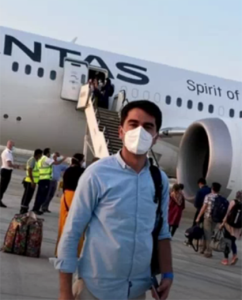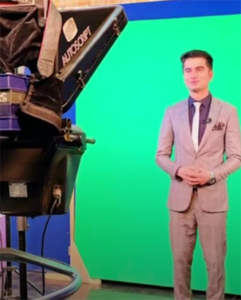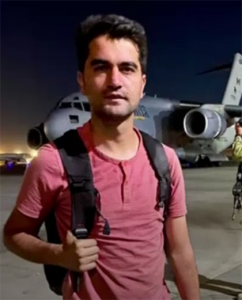Minister’s phone call put Afghan family on flight to safety
A prominent Afghan journalist, now settled in Victoria after fleeing his homeland, has told how federal Minister Senator Linda Reynolds played a personal role in getting his family out of Kabul during this year’s dramatic airlift evacuation.
Khalid Amiri says the Senator was asked by a mutual Afghan friend to assist him, and his family, to escape the Taliban. She was in close contact with Khalid during the harrowing days attempting the perilous trip to the Harmid Karzai airport.
 At one point, Senator Reynolds even spoke to a US marine from Khalid’s phone at Abbey Gate, to request he look after Khalid and his family until Australian officials could ensure that the Amiri family’s departure went smoothly.
At one point, Senator Reynolds even spoke to a US marine from Khalid’s phone at Abbey Gate, to request he look after Khalid and his family until Australian officials could ensure that the Amiri family’s departure went smoothly.
The Senator explained to the Marine that Khalid and his family had Australian visas and the Marine showed great kindness in helping Khalid, his parents and four sisters to the Australian pick up point, near the Baron Hotel.
Khalid had connected with Senator Reynolds, currently the Minister for the NDIS and Government Services, on social media after being introduced through a mutual friend, who was a former senior official in the Afghan Government.
“We are happy and grateful to have received such a warm welcome from the Australian Government and people. My mum says Senator Reynolds is an angel sent from God for us,” Khalid said.
Senator Reynolds’ help was just one episode in Khali’s family’s incredible journey to safety.
Now resettling in Melbourne with his parents and four sisters, Khalid shared his story with iMPACT magazine.
Khalid had connected with Sen Reynolds on social media after being introduced through a mutual friend who was a senior official in the Afghan Government.
“I was in contact with Sen Reynold through WhatsApp and I sent her a text to say they were not accepting my visa,” Khalid said.
“She phoned me and asked to speak to the soldier. She spoke to him for a minute and then he let us through and were taken to the Australian army base,” he said.
 “We are happy and grateful to have received such a warm welcome from the Australian Government and people. My mum says Sen Reynolds is an angel sent from God for us,” Khalid said.
“We are happy and grateful to have received such a warm welcome from the Australian Government and people. My mum says Sen Reynolds is an angel sent from God for us,” Khalid said.
Ms Reynolds’ intervention was just one episode Khali’s family’s incredible journey to safety.
“I had a career in digital media with the national broadcaster RTA (Radio Television Afghanistan). I was a senior producer and presenter,” Khalid said.
“It was hard to leave a job I was passionate about. I was working 12 to 15 hours a day for something I believed in and thinking that our democracy and national government was getting stronger.
“One day I was writing about how the national army was getting stronger and repulsing the Taliban and next I was writing news that the Taliban are entering Kabul.
“We were shattered and broken hearted at the channel. As a state TV employees we had been publishing anti-Taliban propaganda, so everyone was worried. I felt I had to stay on but some of the younger staff members said they want to go home so I told them to go and be safe.
“We had already been getting threatening messages from the Taliban saying that we should be calling their dead fighters “martyrs” in our reports.
“When we refused, they would say things like ‘get ready we are going to blow up you and your TV station’,” Khalid said.
He said there was general panic when people realized the Taliban were taking control of the capital.
“Everyone rushed home that afternoon. I packed my laptop in my bag and went home. I was told to switch off my phone because I could be tracked by its signal,” Khalid said.
“My mum was crying when I got home. She was saying ’they will look for you’. So I moved in with a relative who lived in another part of Kabul. I was there for four or five days and then I went to the airport,” he said.
Helped by an actor friend, Khalid used some theatre craft and subterfuge (the details of which he does not want to reveal) to get past several Taliban checkpoints and reach Kabul’s international airport.
There, he was reunited with his parent and four sisters who had made their way there separately. However, their troubles were only just beginning.
Khalid and his family spent two nights outdoors at the airport trying to find a way in and on to a plane.
“It was very difficult and scary. A lot of my friends didn’t make it to the airport and there were people climbing over each other,” Khalid said.
 “There was tear gas and heavy gunfire into the air. My mum fainted twice and my baby sister was frightened. There was no food but we were able to buy bottles of water from some boys,” he said.
“There was tear gas and heavy gunfire into the air. My mum fainted twice and my baby sister was frightened. There was no food but we were able to buy bottles of water from some boys,” he said.
After a night out in the open Khalid maneuvered his family close to one of the entries across a half-meter deep drain. On the other side of the gap were US soldiers.
“I got into the drain to try to get the coalition soldiers to see my visas – I was there from 11pm to 6am. The soldiers started asking for nationals – for US and British passport holders and others,” he said.
“I tried to show them my visas which were printed out but they said they could not accept paper documents.”
It was then that Khalid’s contact with Minister Reynolds paid off.
“I was in contact with Ms Reynold through Whatsapp and I sent her text to say they were not accepting my visa,” Khalid said.
“She phoned me and asked to speak to the soldier. She spoke to him for a minute and then he let us through and were taken to the Australian army base.
“The moment we were safe we breathed a sigh of relief that we were in safe hands.
“We were on open ground with other families with their bags from 11am till about 3am when we got on a military flight which took us to Dubai where we spent eight days in a camp,” he said.
Khalid said he felt relieved to be safe but guilty at having left so many friends and colleagues behind.
“I was feeling like I had betrayed the people I had left behind and my country. It was strange feeling because the last time I had been through that airport, I was wearing a suit,” he said.
“Now all I had was a bag with my laptop a spare pair of jeans and an extra T-shirt.”
From Dubai, Khalid and his family were flown to Darwin, where they went into quarantine, and then to Melbourne.
Khalid says that while in Dubai Khalid struck up a conversation with an Australia soldier.
 “He asked me what I was reading. I said I didn’t have anything to read but that I was keen to get hold of a book called ‘The Subtle Art of Not Giving a F#$%’ which is about how to live a good and happy life when things do not always go well,” he said.
“He asked me what I was reading. I said I didn’t have anything to read but that I was keen to get hold of a book called ‘The Subtle Art of Not Giving a F#$%’ which is about how to live a good and happy life when things do not always go well,” he said.
“He returned a few days later with a copy of the book he had written in it: “Welcome to Australia. You are just as much as Aussie as the rest of us”.
“I will always treasure that book,” Khalid said.
He says that despite the trauma of fleeing his homeland is optimistic about his future.
“I am happy and grateful to have received such a warm welcome from the Australian Government and people,” Khalid said.
“But I don’t want to be called a refugee forever. I want to develop a career in the media here in Australia,” he said.
Since arriving in Melbourne, Khalid says he is still processing what happened in Afghanistan.
“I’m still in trauma. Every morning I wake up and think it’s a dream. But then I realised it isn’t and that this is my new reality,” he said.
“What hurts most is that we never deserved this. The international community, world leaders and our own president betrayed us.
“All the progress made on women’s rights, girls education and ethnic minority rights vanished in one night. It’s like the world has thrown us to the wolves.
“Leaving one’s home, leaving one’s country is hard. There’s a saying in Afghanistan that no one puts their children in a boat unless they feel it is safer that the land.
“So being a refugee is a hard thing. The world needs to remember that every refugee ones had a wonderful life back home, they had a good job and wonderful living – but all this was snatched from us,” Khalid said.
He said that the Taliban could not be trusted to live up to promises they would be inclusive.
“A recent example is how the Taliban has omitted the ministry for women from the cabinet. It doesn’t seem an inclusive government,” he said.
“There has been the exclusion of important ethnic and religious groups. The Taliban has zero tolerance of other ethnic groups; they believe in hijacking absolute power.
“What has happened in Afghanistan sends a message to young people in Afghanistan. What is says is that even though you have studied for years and gone to university, you are to be deprived of your rights and your jobs. There’s a very dark picture ahead for the Afghan people,” he said.
Khalid said that left Afghanistan with almost nothing.
“I had with me a bag on my shoulder with my laptop containing my work and data and memories. And with a single pair of spare jeans and an extra T-shirt I had to leave my life behind,” he said.
“It is heartbreaking to leave behind the things you have worked for and the things you dreamed of doing. It’s hard to become a refugee; and no one becomes a refugee unless their home is taken away from them.
“It’s a heartbreaking situation, giving up your while life, your relatives, family and friends and setting up in a new corner of the world with new hopes and a new pathway is very challenging and traumatic.
“Right now, I’m still passing through anxiety not knowing what future awaits me. But still, I’m happy I made it here to Australia with mum and my sisters – but I still have my elder brother and sister in Afghanistan which causes us worry. We’ll do our best to get them out.
“But it’s not only my family, there are hundreds and thousands of people across Afghanistan who want to get out. And not just people who worked the coalition or western embassies.
“There are young, bright people – sportspeople, cricketers, singers, artists, poets – who believe that there’s now no future for them under the Taliban.
“The international community needs to hear their voices and do something for them because leaving them behind would be a big betrayal,” Khalid said.
But he said his own ambition was to build a media career here in Australia.
“Journalism is my passion and I studied it at university. Back in Afghanistan I had a career working for a TV station representing my people and talking about issues. I would love to continue that work,” Khalid said.












